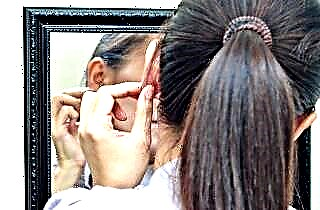A person is never in absolute silence. Studies, the purpose of which was to determine the effect of sounds on the psyche, made it possible to find out: the absence of any acoustic stimuli affects the body extremely unfavorably. The ability to hear the beating of one's own heart and the sounds produced by the digestive organs in the absence of external sound signals "confuses" the senses. However, no less unpleasant is the situation when sounds appear in familiar conditions periodically or constantly without the presence of a tangible source. The causes of tinnitus have been studied for a long time, and today there are many assumptions and proven theories regarding etiological factors.
Causes

"Tinnitus, reasons, how to get rid of?" - this is a topical question for any patient who is faced with the annoying influence of, in fact, nonexistent sounds. In a crowd on the street or in the silence of your favorite room, it makes a persistent noise in one or both ears. The options for sound sensations may vary - for example, not only noise, but also buzzing, hissing. The type of sound does not determine the severity of the patient's condition.
What causes tinnitus? It is best to start the explanation by introducing the scientific definition of tinnitus. The perception of acoustic stimuli that are inaudible to others is called tinnitus. Tinnitus is classified as:
- Primary.
- Secondary.
If it buzzes in the ears, the reasons are not always objectively clear, and often remain unclear even after the examination. In this case, they speak of idiopathic tinnitus. With secondary tinnitus, the doctor can find the reasons - tinnitus can appear as a result of various pathological processes.
Intrusive and non-intrusive tinnitus is distinguished - the difference lies in the level of decrease in the quality of life and the development of functional disorders, the causes of which are associated with the causes of tinnitus. There is also the concept of recent tinnitus that lasts for 6 months. Persistent noise in the ear, the reasons for which are not always clear, can bother patients for more than six months.
Why is my ears buzzing? Tinnitus can be caused by:
- hearing loss;
- industrial noise;
- non-production noise exposure;
- taking drugs with an ototoxic effect;
 tumors of various localization;
tumors of various localization;- violations of the auditory analyzer;
- cognitive impairment;
- increased anxiety, depression.
The heterogeneity of the probable causes of tinnitus necessitates a careful history taking from the patient.
To understand why it makes a noise in the ear, you need to remember when the sound appeared, how intense it is, is noted constantly or occurs periodically. All of these details are important to guess about the factors causing noise, humming and hiss in the ear. The causes of tinnitus may be due to a previous infectious and inflammatory disease. If the patient talks about the appearance of noise against the background of complete health, the diagnostic search will have to be expanded. Before visiting the doctor, you should clarify: whether there were head injuries, whether otitis media occurred (especially when it comes to inflammation of the internal structures of the organ of hearing). Additional symptoms are of no less importance for diagnosis - for example, obsessive headaches, dizziness.
Types of noise
Thinking about what may cause tinnitus, you need to understand: this pathological phenomenon is explained by various provoking factors. Therefore, experts identify several main clinical options according to the cause of the noise in the ear:
- Vestibular.
- Cervical.
- Neuronal.
- Contralateral.
- Central.
Dividing noise into types allows you to narrow the range of diagnostic search. This reduces the time spent on specialized studies, brings the moment of diagnosis verification closer. It is known that timely treatment can achieve much better results than the treatment of diseases identified at a later stage of the course.
The vestibular type is explained by the occurrence of disturbances in the peripheral part of the vestibular analyzer, due to which tinnitus is combined with dizziness.
 Clinical symptoms in the vestibular type can be caused by an inflammatory process in the internal part of the organ of hearing - labyrinthitis.
Clinical symptoms in the vestibular type can be caused by an inflammatory process in the internal part of the organ of hearing - labyrinthitis.
The rationale why tinnitus occurs in the cervical type is the presence of a traumatic injury or degenerative process in the region of the bone and neuromuscular structures of the neck. In this case, the formation of secondary pathological changes, persistent tinnitus are often observed.
With the neuronal type, damage to the root of the auditory nerve is observed, from which the tinnitus becomes constant, intrusive. In this case, the compression of the nerve is only a consequence of the existing pathological process, the variants of which may be different. As a rule, this is a tumor formation.
The peculiarity of the contralateral type is the "transfer" of sound sensation - for example, patients notice a noise in the left ear, the causes of which are caused by pathological changes on the right side.
The central type is observed in disorders of the function of the central parts of the analyzers - both auditory and vestibular. Why is it ringing in my ears? The reason for the onset of tinnitus can be:
- ischemia of the brain stem;
- multiple sclerosis;
- swelling of the posterior cranial fossa;
- tumors of other localization.
If the cause of the noise in the ear is encephalitis, they also talk about the central type of tinnitus. The pathology of the central nervous system and the brain rarely manifests itself with only one symptom, however, sound sensations without generation from the outside should alert the patient in any case.
One-way noise
Tinnitus is not always bilateral. In many cases, patients complain of interfering sounds, clearly indicating the side of the lesion. What is the cause of noise in the right ear and sound sensations in the left? The most common diseases that provoke sound phenomena include:
- Tumor of the posterior cranial fossa.
- Acoustic neuroma.
- Exudative otitis media.
- Adhesive otitis media.
- Eustachite.
- Meniere's disease.
The causes of noise in the ear on the one hand are quite numerous. It should be noted that a tumor of the posterior cranial fossa provokes sound sensations localized to the right or left only with an asymmetric arrangement.
The auditory neuroma, or vestibular schwannoma, grows slowly, sometimes not manifesting any other symptom other than tinnitus for several years. It is considered among the main causes of tinnitus and whistling in the ears. In this case, the localization of sound phenomena corresponds to the localization of the tumor. When deciding why the ear is making noise on the left or on the right, the possibility of a neuroma cannot be excluded.
The causes of tinnitus in a child may be different, but often these are inflammatory lesions of the structures of the organ of hearing, or otitis media. Various sound sensations are observed during the period of growth and height of pathological manifestations, subside as the activity of the inflammatory process decreases. Such tinnitus does not last long if there are no persistent secondary changes.
The causes of noise in the right ear can be inflammation in the auditory tube (eustachitis), which occurs during acute respiratory infections. The penetration of pathogenic flora is facilitated by improper blowing of the nose, constant nasal congestion.Not only acute, but also chronic inflammatory lesions of the respiratory organs are important. systems.
systems.
In Meniere's disease, the noise in the ear is unilateral only at the initial stage.
The appearance of an obsessive "sound background" can also be explained by surgical intervention. Noise in one ear caused by surgical manipulations is caused by the development of postoperative labyrinth irritation syndrome.
The causes of noise and ringing in the ears are sudden changes in pressure (a sharp change in the difference between atmospheric pressure and pressure in the cavities of the hearing organ). Barotrauma occurs during air flights, when diving to a considerable depth, or, conversely, a rapid ascent to the surface of scuba divers. When it makes a noise in the ear, the cause may be a leak in the cockpit. Barotrauma can also be observed in combination with acoustic trauma - in this case, the patient has a buzzing in the ear. The reasons are different - for example, an unexpected shot at the moment when atmospheric pressure rises.
Two-way noise
Why does tinnitus occur? As mentioned earlier, various provocateurs contribute to its appearance, and the source of sound generation is not always located directly in the organ of hearing. Acoustic phenomena, invisible to others, occur with the following diseases:
- otosclerosis;
- bilateral otitis media;
- Meniere's disease;
- sensorineural hearing loss.
It must be remembered that ear noise does not exclude the presence of pathology in the cranial cavity.
Tinnitus in otosclerosis is combined with a decrease in hearing acuity, sometimes with symptoms of damage to the vestibular analyzer. With bilateral otitis media or labyrinthitis, noise can be combined with congestion, hearing loss, or dizziness. Decreased hearing acuity of the sensorineural type can occur after taking medications that have an ototoxic effect. These are quinine, antibiotics from the aminoglycoside group, nonsteroidal anti-inflammatory drugs (Indomethacin, Diclofenac).
In Meniere's disease, during the period of pronounced clinical manifestations, the noise can become constant, increase during seizures and subside during the interictal period. If the patient is asked about the accompanying symptoms, he indicates hearing impairment, nausea, vomiting and dizziness.
 In all cases of tinnitus, it is necessary to find out why the tinnitus is buzzing. What to do and which specialist to contact? A general practitioner or a pediatrician (depending on the patient's age) can conduct an initial examination, collect anamnesis and determine the need for referral of the patient to narrow specialists. If acoustic phenomena are accompanied by symptoms that allow one to suspect otitis media, otosclerosis or other pathology of the hearing organs, it is worth contacting an otolaryngologist. Acoustic neuroma and other diseases associated with damage to the nervous system are included in the range of professional tasks of a neurologist and neurosurgeon.
In all cases of tinnitus, it is necessary to find out why the tinnitus is buzzing. What to do and which specialist to contact? A general practitioner or a pediatrician (depending on the patient's age) can conduct an initial examination, collect anamnesis and determine the need for referral of the patient to narrow specialists. If acoustic phenomena are accompanied by symptoms that allow one to suspect otitis media, otosclerosis or other pathology of the hearing organs, it is worth contacting an otolaryngologist. Acoustic neuroma and other diseases associated with damage to the nervous system are included in the range of professional tasks of a neurologist and neurosurgeon.

 tumors of various localization;
tumors of various localization;

